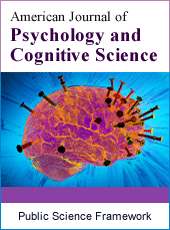American Journal of Psychology and Cognitive Science
Articles Information
American Journal of Psychology and Cognitive Science, Vol.4, No.3, Sep. 2018, Pub. Date: Aug. 10, 2018
The Effectiveness Sand-Playing Therapy on Conduct Disorder of Preschool Students in Shiraz
Pages: 36-40 Views: 2127 Downloads: 597
[01]
Marzieh Zare, Department of Psychology, Arsanjan Branch, Islamic Azad University, Arsanjan, Iran.
[02]
Mahboobeh Chinaveh, Department of Psychology, Arsanjan Branch, Islamic Azad University, Arsanjan, Iran.
[03]
Younes Mohammadzadeh, Department of Physical Education and Sports Sciences, Arsanjan Branch, Islamic Azad University, Arsanjan, Iran.
Study was to evaluate the effects of sand-playing therapy on behavioral disorders among the Pre-school students in Shiraz. The statistical sample was including all Pre-school students in shiraz city which among 30 preschoolers were selected using available sampling methods so that the pre-school students with highest grades were selected based on Ratter’s Pre-school Students behavioral questionnaire, and Placed in experimental (n=20) and control (n=10) groups. Randomly the present study was experimental with pre- test and post – test design including the control group and data analysis was done using descriptive statistics independent t-test and analysis of Variance methods. The results showed that the Sand-Playing technique and store-therapy were effective on behavioral disorders in two studied groups. Also the results of pre-test and post-test grades comparisons in control and experimental groups showed the sand-playing therapy effectiveness on pre-school students behavioral disorders.
Sand-Playing Therapy, Behavioural Disorders, Students
[01]
Barret, L., Beer, D. and Kielhofner, G. (1999). "The importance of volitional narrative in treatment: An ethnographic case study in a week program. Work, 12, 79-92.
[02]
Desocio, J. E. (2005). "Assessing self-development through narrative approaches in child and adolescent psychotherapy". Journal of Child and Adolescent Psychiatric Nursing.
[03]
Doan, R. E. (1998). "The king is dead: long live the king: Narrative therapy and practicing what we preach". Family Process 37, 85-379.
[04]
Drauker, CB. (1998). "Narrative therapy for women who have lived with violence". Arch Psychiatr Nurs, 12, 8-162.
[05]
Furlonger, B. F. (1999). "Narrative therapy and children with hearing impairments". Am Ann Deaf, 144, 325.
[06]
Howard, G. S. (1991). "Culture tales. A narrative approach to thinking, crosscultural psychology, and psychotherapy". American Psychol, 46, 97-187.
[07]
Kestenbaum, C. J. (2003). "Memory, narrative and the search identity in psychoanalytic psychotherapy: a second chance". Journal of Am Acad Psychoanalyst Dyn Psychiatry, 31, 61-647.
[08]
Muntigl, P. (2004). "Ontogenes in narrative therapy: a linguistic-semiotic examination of client change". Family Process, 43, 31-109.
[09]
Murphy-Shigematsu, S. (2000). "Cultural psychiatry and minority identities in Japan: a constructivist narrative approach to therapy". Psychiatry, 63, 84-371.
[10]
Pezeshkian, N. (1996). "Oriental stories as tools in psychotherapy". New Delhi: Sterling Publisher's Pvt. Ltd.
[11]
Romezpour, p. M (1995). Reliability and validity of the Rutter Behavioral Inventory (Teacher's Form) and the Prevalence of Controversial Disorder and Emotional Disorders among Pre-school Children in Ahvaz. Master's Thesis, Iranian Psychiatric Institute, Tehran.
[12]
Rocco. Paolo (2015), In place of words. Journal of sand play therapy- vol IX, no 1.
[13]
Sternberg Allessandra (1996). psychological Assessment of the child patient using Sand play, Dissertation Abstracts International: vol57 (3-6).
[14]
Shapiro, J& Ross, V. (2012). "Applications of narrative theory and therapy to the Practice of family". Family Medicin, 34, 96-100
[15]
Trad, P. V. (2014). "Use of developmental principles to decipher the narrative of Preschool children". J Am Acad Child Adolese Psychiatry, 31, 92-581.
[16]
Zinni. V. Ruth (2016). Differential Aspects of sand play with 10 and 11 year old children, Child abuse and Neglect vol 21, no 7.

ISSN Print: 2381-7453
ISSN Online: 2381-747X
Current Issue:
Vol. 6, Issue 2, June Submit a Manuscript Join Editorial Board Join Reviewer Team
ISSN Online: 2381-747X
Current Issue:
Vol. 6, Issue 2, June Submit a Manuscript Join Editorial Board Join Reviewer Team
| About This Journal |
| All Issues |
| Open Access |
| Indexing |
| Payment Information |
| Author Guidelines |
| Review Process |
| Publication Ethics |
| Editorial Board |
| Peer Reviewers |


